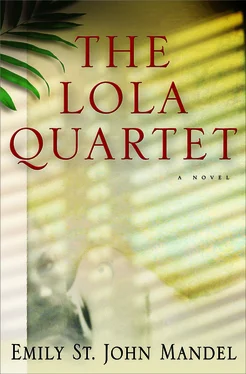"It's you," she said, "I'm so glad it's you," but she understood immediately that something was wrong. He held her for a moment and stroked her hair when she stood up from the swing, glanced over his shoulder before he looked at her again.
"Anna, we have to leave again," he said. "I think he knows you're here."

The morning after the dinner with his sister Gavin woke early in his room in the Ramada Inn, troubled, and lay still in the bed for a few minutes before he remembered the photograph. He turned on the bedside light and went to the desk to retrieve it. The girl stared back at him, ten years old and the image of his sister, half-smiling in an unfurnished room.
He showered and packed quickly, checked out of the hotel, and drove toward the airport for five minutes before he remembered that he still had one last interview. A woman in a planned community far out near the swamps, a friend of William Chandler's. He pulled into a parking lot to check the directions and had to read them three times. It took him twice as long to reach his destination as it should have. He kept forgetting street names, making wrong turns, looking for roads he was already driving on. Where had they been all these years, Anna and the girl? They were all he could think of. If the house where the girl had been staying had been foreclosed, what if she was in a homeless shelter? Or what if it was worse than that, what if she was on the street? The thought of his daughter sleeping under an overpass. He found the condominium complex— far from anywhere, almost beyond Sebastian city limits— and sat in his car for a full two minutes staring at the photograph before he went in.
He sat drinking a glass of water in a large bright kitchen, taking notes and trying to concentrate on what the woman was saying. Her name was Ella Thompson and she wanted to tell him about her children.
"When I was out with William Chandler the other day," he said, "he told me you saw a Burmese python in your backyard."
"Oh, I did ," she said. "Well, not in the backyard exactly, but there's this point where the yard sort of blends into the canal, and—" She was interrupted by the chime of a doorbell. It was her neighbor, a beautiful woman of about fifty with very high cheekbones and silver hair, here to see if she might borrow a stepladder, and yes, she would be delighted to speak with the reporter from New York for a few minutes. She talked about the beauty of Florida, the flowers and the palm trees and the endless summertime, blue pools.
"And how long have you lived out here," Gavin asked, "by the swamps?"
"A few years." The neighbor smiled. "It's funny. We thought we were coming closer to nature," she said, "but all along nature was creeping closer to us."
Gavin said his good-byes and drove to the airport. He found himself staring at children in the terminal lounge. On the flight north out of Florida he tried not to think about anything except the story he was writing, William Chandler in hip waders standing up to his knees in the swamps at the far edge of the suburbs, a radio-tracking device beeping in his hand, "This means there's a python right at our feet, Gavin, right at our feet, you just can't see it because the water's so murky." The nervous residents of the outer suburbs, gazing out their back windows at canals. The conservationist who'd told him that the creatures in the swamps meant they were entering a time when every place would look the same as every other place, the same pythons, the same parrots, the same palm trees from Florida to Indonesia to Argentina, an ecological flattening of experience. He worked steadily until the island of Manhattan appeared below his window, and then he closed his laptop and tried not to think about the girl during the descent.
Th e f i r s t thing Gavin heard when he opened the door to his apartment was the leaking shower. It seemed to be getting worse, the drips more frequent, but he still didn't know where the landlord's phone number was and now he was too distracted to care. He left his suitcase in the apartment and took the subway to work. The newsroom seemed somehow changed in his absence. There were fewer people here than usual. A sense of dissipation hung in the air. It reminded him of the time when he'd come in late on a Christmas Eve to wrap up a piece and found the newsroom a shadow of itself, a ghost town. But the difference now, he realized with a lurching feeling in his stomach, was that a dozen desks had been cleared. Silas's papers and notebooks and the photograph of his wife had vanished, his computer monitor a dark window reflecting Gavin back at himself and behind him a ghostly version of the newsroom, all shadows and pale smudges of light.
"You missed all the fun," his editor said when he came to her.
"Where's Silas?"
"Sit down." There was a tiredness around her eyes that he hadn't seen before. He sat by her desk. "We were treated to a speech the day after you left," she said. "Declining ad revenue, ever fewer subscribers, the relentless expectation of free online content, et cetera. You've heard it before. It's a boring story."
"Why didn't you tell me?"
"Why didn't I take the time to call you in Florida and explain that twelve of your colleagues had been laid off? Because believe it or not, kiddo, I've been a little busy in their absence." She told him the names and some of them were friends of his.
"Christ," he said. "Can you tell me anything else?"
"You're wondering about your job. I'm wondering about mine too." Julie sighed. "I don't know what to tell you," she said. "You're in a strange position. On the one hand, you're not that senior. On the other hand, that means you're relatively cheap. No offense."
"None taken. I've seen my pay stubs."
She took off her glasses and massaged her temples for a moment before she spoke again. "Listen," she said, "just between us, there's likely to be a second round of layoffs."
"Do you know who.?"
"No. But I know they're looking to make some cuts in the newsroom." She put her glasses back on and blinked at him. He liked her glasses. They were a stylish rectangular shape that he admired. "Gavin, your stories are always good," she said, "but if there was ever a time to make them better, this is it. There's going to be some scrutiny over the coming weeks."
"Whoever writes the best stories gets to stay employed? Are you serious, Julie?"
"Just write the best stories you can, Gavin, and try not to think about it too much. I'm giving you a heads-up because I don't want to lose you."
He settled back at his desk with his notes from Florida and tried to concentrate. He'd reached this morning's interview. Ella Thompson in her house by the canal, her neighbor. We thought we were coming closer to nature, but all along nature was creeping closer to us. He'd decided this was the quote that would close the story, but then he glanced again at the page and his breath caught in his throat. He'd written the neighbor's name as Chloe Montgomery.
Gavin swore softly. Whatever the neighbor's name had been, he was certain it wasn't Chloe. He was almost certain it had started with an L. Lara, Lana, Laurie, Louise? He tried to transport himself back to the scene: the kitchen island with the stools and the cup of coffee before him, Ella telling him about her children, the doorbell ringing and the neighbor walking into the room. "Gavin, this is L—!" Ella Thompson says brightly, but the name is a blank.
Gavin flipped through the pages of the notebook. He had been so distracted that morning, all his thoughts taken up by Anna and Chloe, that he'd seemingly neglected to write down the neighbor's telephone number. He called Ella Thompson, but her phone only rang endlessly, and he remembered her telling him that she was about to leave on vacation. He found contact information for the management office and spent some time arguing with a secretary and then her boss, but they refused to reveal names of residents.
Читать дальше













